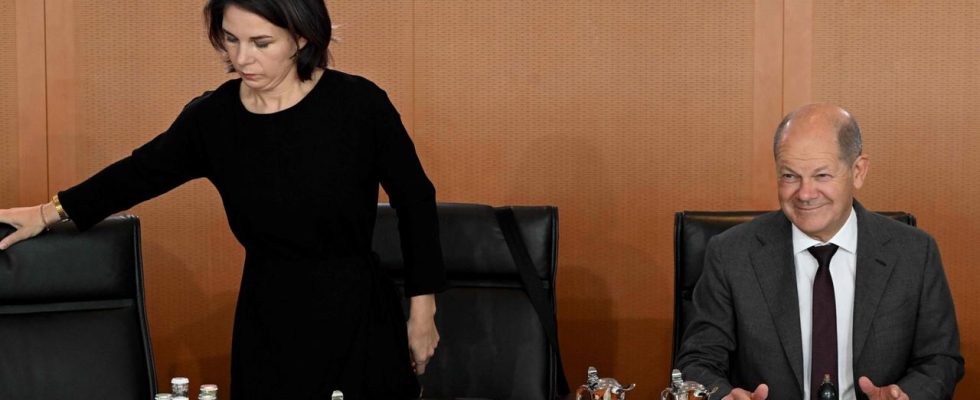analysis
The Greens are against it, the FDP and parts of the SPD are in favor – the Chancellor has now decided: Germany will not block a tightening of the EU asylum regulation. Interior Minister Faeser announced more border controls for Germany.
The traffic light dispute over the EU asylum compromise, which is intended to limit illegal migration, was simmering noisily. The Greens and the FDP in particular argued publicly. Today Chancellor Olaf Scholz set the line – like that ARD capital studio learned from government circles – and thus brought parts of the Greens, but also his SPD, on course. According to the Chancellor, Germany should no longer refuse to talk about the so-called crisis regulation, which is supposed to be part of the asylum compromise.
Lower standards for asylum procedures
Just in time for a meeting of EU interior ministers on Thursday, the Chancellor is giving his negotiator Nancy Faeser leeway to continue negotiating and agreeing on the details of the regulation. That should bring a sigh of relief in Brussels. In the EU Parliament, the crisis regulation is seen as a question of solidarity.
If member states find themselves in a crisis situation due to high migration pressure, compromises should be made in the standards for asylum procedures at the borders. In addition, member states would no longer be obliged to take back asylum seekers for whom they are actually responsible but who have traveled on to another EU state.
Defeat for the Greens
For the Greens, the Chancellor’s power word means a defeat. Foreign Minister Annalena Baerbock recently warned against the introduction of the so-called crisis regulation. She explained on Sunday on responsible.”
If Germany abstained from the crisis regulation proposed by the Spanish EU Council Presidency, it could have led to a blockage in the reform of the Common European Asylum System (CEAS). The EU states could not have positioned themselves together for the negotiations with the European Parliament on the EU asylum compromise.
Sharp criticism from the FDP
The Greens’ blockade caused a heated argument at the traffic lights. The FDP sharply criticized its coalition partner. Secretary General Bijan Djir-Sarai said at the end of last week: “Whether with reforms at the European level or with the classification of safe countries of origin: the Greens are a security risk for the country in migration policy and, through unrealistic positions, make consistent government action and cross-party solutions more difficult.”
FDP leader Lindner, like Scholz, is of the opinion that talks in Brussels about the crisis regulation must not be stopped. He told the “Frankfurter Allgemeine Zeitung” that Germany should not block a “responsible compromise”. Given the high number of migrants arriving in Germany, it is about “maintaining social peace”.
After today’s course clarification in the Berlin cabinet, the Foreign Office said quite briefly: “Now negotiations are finally taking place properly in Brussels.”
Faeser announces flexible border controls at
For Germany, the Federal Interior Minister will lead further discussions at the meeting of the EU Interior Ministers on Thursday. She is “very optimistic that we will successfully complete the European legislation on this,” explained Faeser.
For Faeser, the reform of the Common European Asylum System is the decisive step towards a significant reduction in irregular migration. She underlined this today when she announced stricter measures at the national level. The Interior Minister ordered “flexible priority controls” at the German borders with the Republic of Poland and the Czech Republic.
In addition to the already highly intensified veil search throughout the border area, controls are to take place both in the border area and at times directly at the respective border line. Depending on the current situation, they will be carried out flexibly in terms of space and time and alternating along the smuggling routes, she said.
Customs should help with controls
There had previously been debate about stationary border controls with Poland and the Czech Republic. The Greens had expressed criticism of these. “These border controls at the border posts make no sense because irregular migration does not come about in the first place,” said co-party leader Omid Nouripour on Monday in Berlin. “She comes between the border posts.” Mobile control teams are more important.
Faeser receives support from the coalition partner FDP for the expanded border controls. “We are particularly concerned about smuggling crime,” said Finance Minister and FDP leader Christian Lindner in the Bundestag on Wednesday. The customs department under his command should provide up to 500 officers to enforce border controls. Germany has gradually lost complete control over its borders in recent years, says Lindner: “This situation must not continue.”
Opportunities for a European solution are increasing
Politicians are under pressure: the number of illegal entries into Germany is increasing, and the accommodation of refugees is becoming a stress test for states and municipalities. The traffic light government wants to take more decisive action against illegal immigration with tighter controls at the German borders.
At the same time, it relies on European solutions to the migration issue. The fact that Germany is moving on the issue of the crisis regulation increases the chances of passing asylum reform before the European elections.

